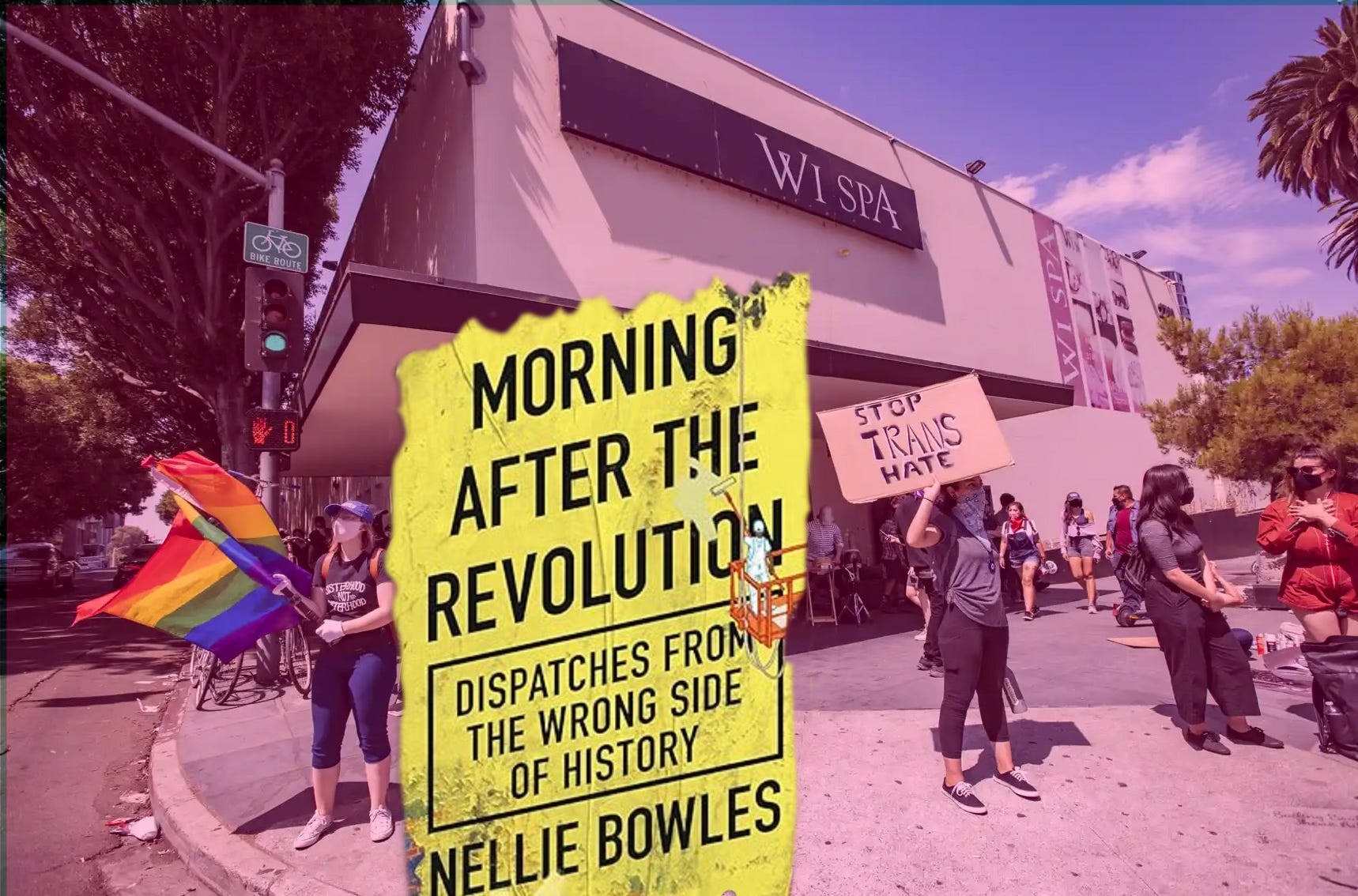
Nellie Bowles Thoroughly Humiliates the New York Times
 2024-05-18
2024-05-18
In 2024, the most radical act imaginable is telling the truth. Nellie Bowles has done just that with her new book, Morning After the Revolution. She lays out in painful but funny detail the madness we’ve all just lived through that almost no one will talk about.
Bowles is too nice to humiliate the New York Times outright; she was their “golden girl,” after all, once upon a time. But her book humiliates them all the same, just by doing good reporting and telling the stories they refused to tell.
In one riveting, tragic, hilarious passage, Bowles describes what happened at the Wi Spa in Los Angeles:
“Wi Spa billed itself as “a convenient and affordable place to de-stress and be pampered,” but one summer week in 2021 it became a site of great stress because of one (allegedly, partially) erect penis that had manifested in the women’s room.”
She continues:
“The spa, in Los Angeles’s Koreatown, has separate men’s and women’s areas where people go naked. The penis went bobbing through the women’s space. The penis had been seen soaking in the women’s communal soak pools. Women enjoying their spa time were upset. One went to the front desk asking for help, saying there were children present and that there was a man in the bathroom. The front desk could not help. The person with the penis had a California driver’s license that listed their gender as “female.” The penis was white, and some of the women who didn’t want to see it were black Hispanic, which in the summer of 2021 might have helped draw knee-jerk public sympathy, but apparently did not.”
For a movement afraid of harm being done by mere words, they seemed to be perfectly comfortable with real harm being done to young girls, to women in sports, and pre-teens sucked into “gender-affirming care.”
Bowles doesn’t just describe what happened at the spa; she tracks down the sex offender himself and discovers that, yes, he’d done it deliberately, and, yes, he was erect while doing so. But was there ever any major reckoning in the press? No.
I quickly searched the New York Times for “Wi Spa,” and of course, there was nothing about this scandal, even though it was such an interesting story. Why didn’t they want to touch it? Because it called into question their absolutism about “trans women” being women.
The Times should be as thoroughly humiliated by Morning After the Revolution as NPR should be after Uri Berliner’s essay. They no longer care about chasing the story at all costs. They only care about serving the ideology at all costs.
It shouldn’t be surprising that the Times and other “prestige” outlets would pan Bowles’ book and attempt character assassination on her. What else are they going to do? Admit that they gaslighted Americans and allowed themselves to be manipulated by a “Lord of the Flies” contingent of crybaby brats who felt unsafe around reporters like Donald McNeil? Will they come clean and admit they essentially work for the Biden administration as a slightly more sophisticated version of Joe and Mika? Not a chance.
The publisher isn’t taking their criticisms seriously, nor should they. Instead, they celebrated their takes:
The negative reviews read like a chapter in Bowles's book. The Washington Post’s Becca Rothfield disguises her resentment and embarrassment by casting Bowles as the condescending elite. The lady doth protest too much, methinks:
She writes:
The real question is not about whether there are “Narrative Enforcers” at the New York Times, as Bowles alleges, but why there is a market for so many books like this, even though they are all so predictably indistinguishable from one another. Bowles’s book appeals for the same reason that other conservative memoirs of political “growth” do: because they reassure their readers that progressivism is not a genuine political philosophy but an almost biological byproduct of youth, like acne. Bowles and her ilk are thereby absolved from contending with the principles of those who oppose them, or from seeing their political nemeses as rational moral agents.
Then there is Laura Kipnis at the New York Times, whose CV reads exactly like Rothfield’s: academia, awards, universities, citations, more awards, more citations. They could be the same person.
She writes, “By fringe, she means trans. She’s peeved that some trans women are trying to redefine feminism in ways that seem to her to be anti-woman, resents that lesbians risk being erased by trendy all-purpose queerness and fears that as a married lesbian mother she will have her own rights swept away by anti-trans backlash. Given the Dobbs decision, all precedents are possibly imperiled, but the culprit isn’t transgender-rights activists. It’s the religious right and the Supreme Court, both of which get a pass from Bowles, as do Donald Trump and every elected Republican.”
And there it is, the message loud and clear: those bad people on the Right are the problem, not us, not the crazies who have destroyed nearly every great thing about American culture, and have destroyed feminism. Not will. Have. It’s been gutted. It no longer exists.
And then we get Mollie Fischer, yet another carbon copy of the same kind of writer/thinker/activist at The New Yorker:
What can we expect from someone whose last article was “Why We Choose Not to Eat, Can the decision to forgo food be removed from the gendered realm of weight-loss culture?”
This is the sad, silly fact of what the Left has become once it aligned with power, wealth, and politics: boring. Insular. Naval gazing.
Michelle Goldberg decided the review in the Times wasn’t enough and wrote an entire op-ed about Bowles:
“There are aspects of the New Progressivism — its clunky neologisms and disdain for free speech — that I’ll be glad to see go. But however overwrought the politics of 2020 were, they also represented a rare moment when there was suddenly enormous societal energy to tackle long-festering inequalities. That energy has largely dissipated, right when we need it most, heading into another election with Trump on the ballot.
Trump Trump Trump. The closer anyone gets to Trump, the farther away they get from the MISSION. It’s one or the other. You’ve read 1984. You know the deal. Love Big Brother or you’ll be another enemy of the state. You’ll be Goldstein. You’ll be unpersoned.
The reckoning I waited for is never coming. I know that. Just as I know many of my friends will never apologize or ever have any awareness of what they went along with. I knew that back in 2020 when a local news station told the story of Sue and her 100 year-old mattress store. I was screamed at by my friends for even mentioning it.
Now, many of them must feel a combination of fear and shame but would not dare risk their place in utopia to talk about it, even if more and more people seem to feel comfortable doing so. So down the memory hole it will go.
As Bowles said in her appearance on Bill Maher, there has never been any apology or acknowledgment of what we’ve just lived through. We’re owed at least that much, not just for how they treated their own reporters, editors, or researchers at the hands of fanatics but also for the stories they refused to tell that the American public deserved to know.
In their podcast, America This Week, Walter Kirn and Matt Taibbi discuss the short story Christmas Not Just Once a Year, by Heinrich Böll. The story is about mass delusion and why almost no one can or will put a stop to it because it’s just too hard.
When I think about what’s happened to this country and I try to find something that is horrifying enough to warrant a comparison to what happened in Germany, I land on “trans kids,” this bizarre new idea that has been normalized in our culture to the point where all schools, all institutions and all politics on the Left are going along with it, even though it sends children down a dangerous path they can’t come back from.
I’m not saying it’s as bad as the Holocaust, but I am saying the madness is on par with what people have gone along with at the worst moments in our history. That’s why Sweden, the UK, and other countries have backed way off of “gender-affirming care.”
It’s almost Pride month. They will fly the flag at elementary schools right next to the US flag. What chance do any of these kids have? With so many parents so afraid to stand up to the activists lest they be called a “bigot,” we’re left with few choices when it comes to November 2024. If you want this stopped, you can’t vote for Democrats.
Yet, Nellie Bowles probably will. She is a lesbian married to Bari Weiss, and pregnant with their second child. But at least she is a voice the New York Times can’t ignore.
How did a book like this even get published anyway? We all know the rules. Sensitivity readers and activists posing as staffers are constantly breathing down the neck of the editors to ensure full compliance.
Enter Thesis, an adjunct of the Penguin Group that launched in 2023, that was “committed to publishing bold ideas that shape tomorrow’s discourse.” You might call them the first major “heterodox” publishing house that hovers in that sweet spot outside the clutches of the “woke” Left but still enough inside as not to cross the Trump line.
They are ahead of the game, joining a growing group of voices just before the inevitable counterculture revolution hits. Expect to see more like them and more voices like Nellie Bowles.
At the end of the book, Bowles mentions how someone she knew ended their friendship because she refused to cancel a colleague. Now that story is in print for all time. That woman will have to live with being one of the bad guys, even if it will be years before she realizes it.
//
This is a public episode. If you’d like to discuss this with other subscribers or get access to bonus episodes, visit sashastone.substack.com/subscribe
More Episodes
 2024-11-01
2024-11-01
 2024-10-31
2024-10-31
 2024-10-27
2024-10-27
 2024-10-25
2024-10-25
 2024-10-22
2024-10-22
 2024-10-09
2024-10-09
 2024-10-04
2024-10-04
 2024-09-30
2024-09-30
 2024-09-26
2024-09-26
 2024-09-24
2024-09-24
 2024-09-19
2024-09-19
 2024-09-12
2024-09-12
 2024-08-19
2024-08-19
Create your
podcast in
minutes
- Full-featured podcast site
- Unlimited storage and bandwidth
- Comprehensive podcast stats
- Distribute to Apple Podcasts, Spotify, and more
- Make money with your podcast
It is Free
- Privacy Policy
- Cookie Policy
- Terms of Use
- Consent Preferences
- Copyright © 2015-2024 Podbean.com





